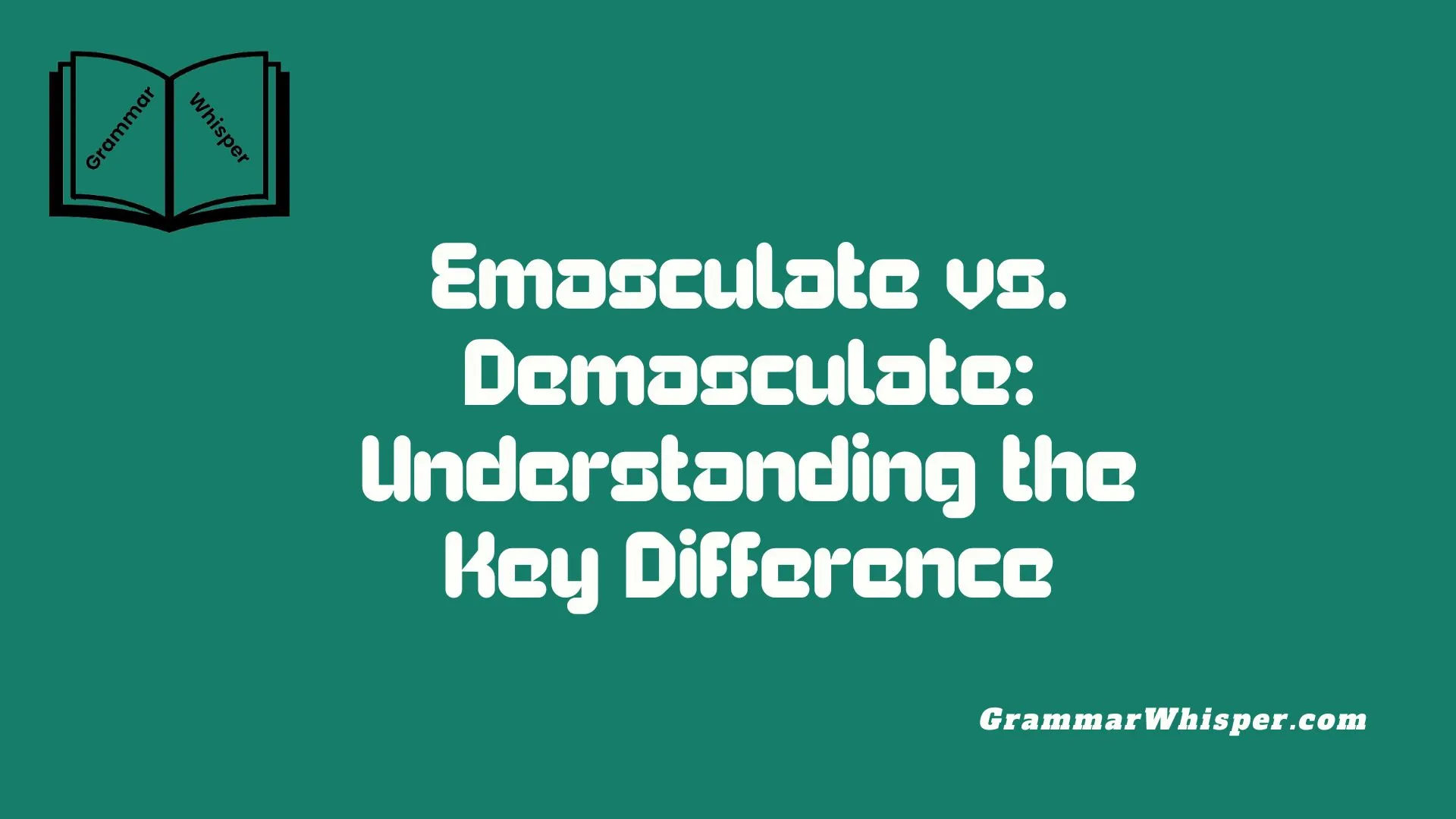Language is constantly evolving, and with its development come many nuanced terms that help us understand complex ideas about culture, gender, power, and dynamics. The words emasculate vs demasculate often stand side by side and are used interchangeably by some, but they carry distinct meanings and implications. In this blog post, we explore the differences by looking at their historical contexts and how they have evolved within linguistics and gender studies. If you’re curious about their impact on daily communication, knowing the distinction is essential.
From my experience, understanding this difference is a key step in mastering language related to gender and power. These terms shape how we communicate ideas and feelings, so recognizing their meanings helps avoid confusion. Whether in a formal discussion or casual talk, the right use of emasculate or demasculate can change the tone and clarity of your message. This deeper understanding reflects the broader dynamics of language and its role in expressing identity and societal roles.
Tracing the Origins: The Historical Roots of “Emasculate”
The word “emasculate” comes from the Latin word emasculare, which means “to castrate” or “to deprive of male attributes.” Its history can be traced back to ancient practices, where the act of emasculation was used as a form of punishment, power assertion, or even in certain religious or cultural rites. The word itself is composed of two parts: e- (a prefix meaning “out of”) and masculus (meaning “male” or “masculine”). Over time, the term evolved beyond its biological meaning to encompass broader metaphorical uses, particularly in social and psychological contexts.
Fun Fact: In medieval times, emasculation was a method used for those who were either punished or enslaved. It was seen as a way of rendering someone powerless, not only physically but symbolically.
Breaking Down “Emasculate”: Definitions and Usage
The term “emasculate” is used in a variety of contexts, with its meaning shifting depending on the situation. Below are some of the key uses of the word:
- Biological Context: In its most literal form, emasculation refers to the removal of male genitalia or reproductive organs. Historically, this practice was common in ancient civilizations where it was associated with castration, often performed to ensure that male slaves or servants couldn’t produce offspring. In some rare medical cases, emasculation refers to the removal of male reproductive organs due to injury or illness.
- Metaphorical Use: Today, “emasculate” is often used metaphorically to describe the process of stripping someone, typically a man, of his masculinity or power. This could be through emotional or psychological means, such as humbling someone to the point where they feel impotent or weak. Common phrases like “feeling emasculated” or “emasculating someone” often refer to the loss of power, confidence, or social standing.
The Literal Biological Context of “Emasculate”
To understand the historical significance of emasculation, we need to look into its roots in biology and medicine. Originally, the word described a surgical procedure that involved the removal of male genitalia, typically in the context of punishment or control.
In ancient societies, such as Rome or Greece, emasculation was a method used to eliminate a person’s potential for reproduction, a factor that was seen as critical to maintaining social order. Castration was also performed on slaves or servants in royal courts to prevent them from fathering children who might rise to power. Interestingly, the practice wasn’t only about removing physical organs; it was about removing the societal power associated with masculinity and lineage.
Emasculation in Modern Medicine: In the modern world, emasculation rarely occurs unless there is a specific medical need, such as for gender confirmation surgeries or in rare cases of cancer. Medical professionals perform these surgeries for health reasons rather than as a method of punishment or control.
Metaphorical Implications of “Emasculate”
The shift from the biological to the metaphorical meaning of “emasculate” occurred as society’s understanding of gender and power evolved. Today, the term is most commonly used to describe emotional or psychological emasculation — that is, the stripping away of a man’s perceived masculinity or authority.
This use of “emasculate” is prevalent in the following contexts:
- Social and Cultural Impact: In modern society, the concept of masculinity is often associated with power, control, and dominance. When someone feels “emasculated,” it typically means they’ve lost some form of these qualities, often in front of others. This can happen through humiliation, failure, or public exposure of vulnerability. For instance, a man who is publicly criticized or made to appear weak might describe himself as feeling emasculated.
- Psychological Effects: The psychological effects of feeling emasculated can be severe. For many men, their sense of identity is closely tied to their ability to exert control and influence. Feeling emasculated might result in anxiety, depression, or a sense of worthlessness. As we move toward a more gender-fluid and inclusive world, discussions of “emasculation” are increasingly being tied to critiques of toxic masculinity.
“Emasculate” in Botanical Sciences: A Scientific Perspective
Interestingly, “emasculate” also has a meaning in the world of botany. In plant sciences, emasculation refers to the removal of male reproductive organs (the stamens) of a flower, especially to prevent self-pollination and ensure cross-pollination. This process is crucial in plant breeding, where the goal is often to control the genetic traits passed on to the next generation.
Example: In the breeding of certain hybrid plants, emasculation is performed to allow pollen from a different plant species to fertilize the flower. This ensures a more controlled and predictable result, allowing botanists to experiment with various plant combinations.
Demasculate: The Misconception in Modern Language
While “emasculate” has been in common use for centuries, the word “demasculate” is not recognized as standard English. Yet, it is still seen occasionally in informal settings, often confused with “emasculate.” The creation of “demasculate” is a linguistic error, as it incorrectly assumes that “emasculate” can be reversed. In fact, “demasculate” doesn’t have an established place in either the medical or cultural context.
Why does this confusion exist? Some might assume that “demasculate” refers to restoring masculinity after it’s been lost, but there’s no historical precedent for such a term. Language evolves, but in this case, the word doesn’t hold any real meaning, and it’s best to stick with “emasculate” when discussing the loss of masculinity or power.
Emasculate Beyond the Dictionary: Cultural Impact and Controversy
In the broader cultural context, emasculation has often been used as a tool for asserting power. Whether through political commentary, social critiques, or popular media, the concept of emasculating a man has been a way to diminish his influence. It’s tied closely to the concept of power dynamics in gender relations, where men are often expected to remain dominant or strong. In many cases, emasculation is seen as the ultimate insult to a man’s sense of self.
This idea is especially prevalent in:
- Media: Movies and TV shows often use emasculation as a plot device. A character who loses his power or authority is often portrayed as “emasculated,” reinforcing the idea that masculinity is something that must be guarded at all costs.
- Political Discourse: Politicians sometimes use emasculation as a strategy to undermine their opponents. By questioning their masculinity or suggesting that they lack strength, political figures can diminish an opponent’s credibility or influence.
Gender Roles and the Emasculation Debate
One of the most significant areas where emasculation plays a role is in the ongoing debate about gender roles. The concept of “emasculation” has long been used to perpetuate traditional ideas about what it means to be a man. The idea that men must be dominant, strong, and unemotional has often been tied to the fear of emasculation. However, with the rise of feminist and gender-neutral movements, these rigid gender expectations are increasingly being challenged.
Toxic Masculinity and Emasculation: The phrase “toxic masculinity” refers to harmful societal norms that encourage men to suppress emotions, exhibit dominance, and avoid vulnerability. Emasculation often occurs when a man feels as though he is failing to meet these expectations, causing him to internalize negative emotions. As society continues to redefine masculinity, these views are slowly shifting.
Shifts in Perspective: New Dialogues and Changing Attitudes Toward Emasculation
The conversation surrounding emasculation is shifting as we become more aware of how restrictive gender roles can negatively affect everyone. There is growing recognition that vulnerability, empathy, and emotional openness are not signs of weakness, but signs of strength. Men are increasingly encouraged to embrace these qualities, challenging the idea that emotional vulnerability leads to emasculation.
Redefining Masculinity: Many individuals and organizations are working to redefine masculinity in healthier ways. Emasculation is being deconstructed as a tool of control, and instead, there’s a push toward a more inclusive, compassionate, and emotionally intelligent form of masculinity.
Articulating Clearly: Choosing Between “Emasculate” and “Demasculate”
When it comes to proper usage, there’s no real reason to use “demasculate.” The term “emasculate” remains the correct and widely accepted term in both medical and cultural contexts. While “demasculate” may pop up in casual conversation or online discourse, it’s important to remember that it’s not recognized in formal language.
Tip for Clarity: If you want to convey the idea of someone recovering their masculinity, use more precise terms like “reasserting masculinity” or “restoring confidence.”
Conclusion
As language evolves, so do the terms we use to express complex ideas about power, identity, and social dynamics. The distinction between “emasculate” and “demasculate” is important, not just for linguistic clarity but for understanding the cultural and psychological implications of these concepts. Emasculation has deep historical roots, but its current usage often extends far beyond biology, becoming a powerful tool for social commentary, especially in the context of gender roles. By better understanding these terms, we can navigate the complexities of masculinity, power, and vulnerability in a more informed and nuanced way.
This blog post provides a comprehensive exploration of the terms “emasculate” and “demasculate,” offering deep insights into their meanings, cultural significance, and the shifting landscape of gender identity.
Faqs
What is the difference between “emasculate” and “demasculate”?
“Emasculate” refers to the act of depriving someone, usually a man, of their masculinity or power, either literally (such as through castration) or metaphorically. “Demasculate” is often mistakenly used in place of “emasculate,” but it is not a recognized word in the English language.
How has the term “emasculate” evolved over time?
Originally, “emasculate” referred to the literal removal of male genitalia. Over time, its usage expanded to include the metaphorical loss of masculinity or power, often in social or psychological contexts. This evolution reflects broader changes in societal views on gender roles and power dynamics.
Can “emasculation” be both biological and psychological?
Yes, “emasculation” can refer to both biological and psychological contexts. Biologically, it involves the removal of male genitalia, while psychologically, it refers to the feeling of losing power or masculinity, often resulting from humiliation or emotional distress.
Is “emasculation” always a negative term?
While “emasculation” often carries negative connotations, especially in its metaphorical use, it can also be part of broader conversations about gender equality and the deconstruction of harmful masculinity norms. Some people use it to critique traditional gender roles that stifle emotional expression in men.
Why is “demasculate” not a valid word?
“Demasculate” is not a standard word in the English language. It is an erroneous term often confused with “emasculate.” Language experts and dictionaries do not recognize it, and it has no established meaning in either medical or cultural discussions.











